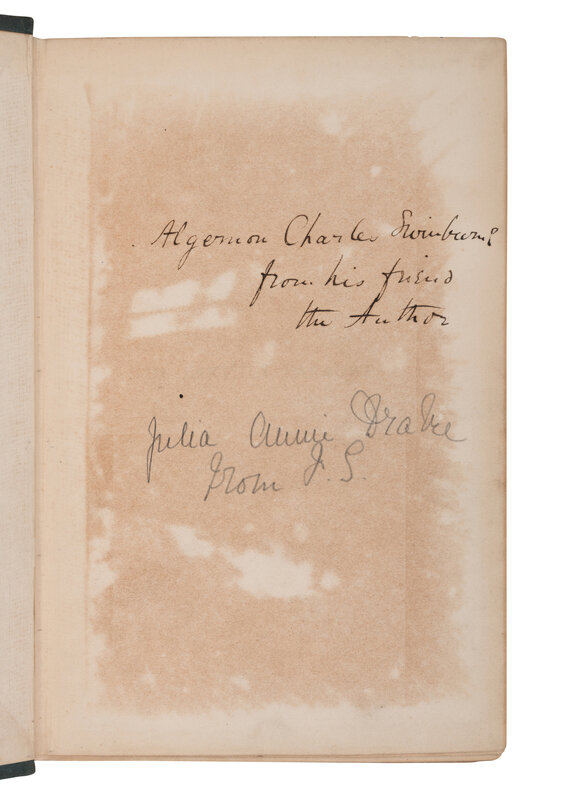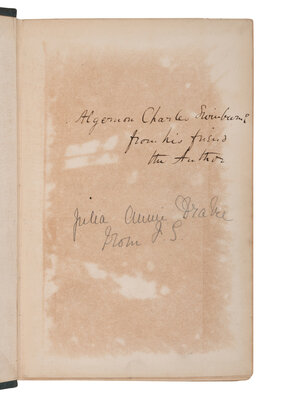Lot 100
[FINE PRESS -- KELMSCOTT]. MORRIS, William. The Earthly Paradise. PRES. COPY INSCR. BY MORRIS TO SWINBURNE.
Sale 2065 - Fine Printed Books and Manuscripts, Including Americana
Nov 14, 2024
9:00AM CT
Live / Chicago
Own a similar item?
Estimate
$2,000 -
3,000
Price Realized
$2,286
Sold prices are inclusive of Buyer’s Premium
Lot Description
[FINE PRESS -- KELMSCOTT PRESS]. MORRIS, William (1834-1896). The Earthly Paradise. London: F.S. Ellis, 1868-1870.
4 volumes, 8vo. 2pp. publisher’s advertisements at end of first volume, 8 pp. publisher’s advertisements at end of second volume, 8pp. publisher’s advertisements at end of vol. IV. (Some very light spotting.) Original dark green cloth, printed spine labels (rubbing, fraying at spine ends); slipcase. Provenance: Armorial bookplates; Algernon Charles Swinburne (1837-1909), English poet, playwright, novelist, and critic associated with the Pre-Raphaelites (presentation inscription from author in first volume); Harry Bache Smith (1860-1936), English writer and composer (bookplate in first volume); H.M. Taylor (ownership inscription to second volume); Julia Annie Drake (gift inscription in first volume).
A SUPERB PRE-RAPHAELITE ASSOCIATION.
FIRST EDITION of vols. 1, 3, and 4; vol. 2 is a fifth edition. PRESENTATION COPY INSCRIBED BY WILLIAM MORRIS IN VOLUME ONE TO ALGERNON CHARLES SWINBURNE; ADDITIONALLY INSCRIBED BY PUBLISHER FREDERICK STARTRIDGE ELLIS IN VOLUME THREE.
The friendship between William Morris and Algernon Charles Swinburne began when the two were students at Oxford University. Their relationship has at various times been described as one of near-hero worship on Swinburne’s part, with the younger poet said to have burst into tears upon hearing Morris’ first reading of “The Haystack in the Fields.” The admiration seems to have been reciprocated, as Swinburne would describe in a letter addressed to John Nichol and dated 13 December 1857 a night of poetry reading in which Morris praised Swinburne’s poem "Queen Yseult" as “much better than his own poem, which opinion I took the liberty to tell him was absurd.”
In the years following the conclusion of their studies at Oxford the two remained close, with Morris providing encouragement and support to Swinburne as he established himself as a working poet. Similarities between the works of Morris and Swinburne were to be found through the rest of their careers, a comparison which caused enough consternation on Swinburne’s part to evince an irritated rebuttal in a letter to Nichol written in 1876.
These comparisons had little if any adverse effect on their friendship, however, as their mutual admiration would continue the rest of their lives, with Swinburne always among the first to receive new copies of Kelmscott Press books, each inscribed by Morris. Following Morris’s death in October 1896, Swinburne would write to his mother, “it is unlike any other loss…my friendship began with him in ’57…and was never broken or ruffled for a moment; tho’ for many years we had hardly ever met, it was none the less cordial and true.” Buxton-Forman, The Books of William Morris, pp.51-55.
Condition Report
Contact Information
Auction Specialist

